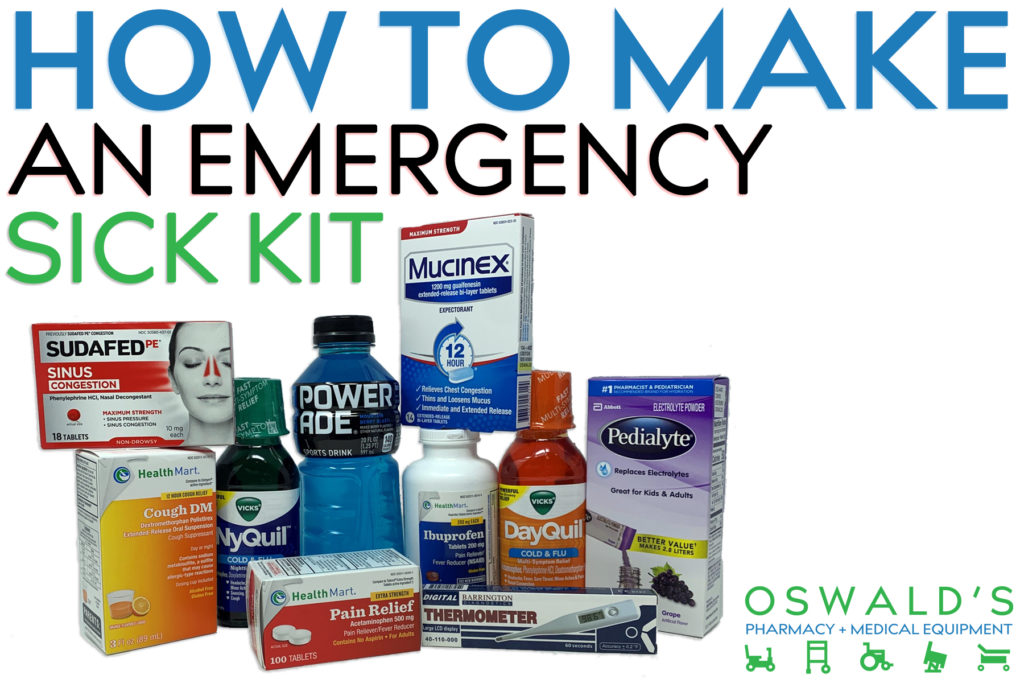As the only pharmacist in my family, I often get asked what over-the-counter medications one should take for different ailments. When COVID-19 started coming to the United States, my dad asked me to make a kit of medications they might need in case they get sick and need to self-isolate. I walked around our OTC section at Oswald’s and bought items that I thought would be most useful. Below is my list of medications and my rational for choosing them.
A List of Medicines for an Emergency Sick Kit
- Ibuprofen (Advil): Ibuprofen is good for helping with inflammation and for bringing a fever down. You can alternate this with acetaminophen to reduce a fever. Not everyone can take ibuprofen, so ask your pharmacist or doctor before use if you have any kidney issues or take a blood thinner.
- Note: Ibuprofen should be avoided for COVID-19-like symptoms. Ibuprofen is great to have for regular illness.
- Acetaminophen (Tylenol): Acetaminophen is also great at bringing a fever down. You can alternate this with ibuprofen to reduce a fever. A note of caution – many combination cough and cold products (Dayquil, Nyquil, Theraflu, etc.) also have acetaminophen in them as a main ingredient. Taking too much acetaminophen can cause damage to your liver. General limits on daily acetaminophen levels are between 3,000 mg and 4,000 mg, depending on your age and other conditions you may have. Ask your pharmacist or doctor for more information.
- Combination Cough and Cold products (Dayquil, Nyquil, Theraflu, etc.): These are great because they have multiple medications and can address multiple symptoms, all in one medicine. Daytime products usually have acetaminophen (the main ingredient of Tylenol), phenylephrine (a decongestant), and dextromethorphan (a cough suppressant). Nighttime products usually have the same as daytime products with the addition of an antihistamine, which will make you drowsy and dry you up to help you sleep. If you buy these medications and are taking other over-the-counter medications, make sure you are not doubling up on any of the active ingredients!
- Guaifenesin (Mucinex): Mucinex is an expectorant that is great for helping to break up mucus in your chest, making it easier to cough up and eliminate. Please note that it does not stop a cough. It seems like coughs associated with COVID-19 may be of the mucus-y kind, so Mucinex is a good choice. Take this medication with plenty of water, as water is a natural expectorant!
- Dextromethorphan (Delsym): This is a cough suppressant, which means that it helps to stop a cough. Another note of caution – combination cough and cold products (Dayquil, Nyquil, Theraflu, etc.) usually also contain dextromethorphan in them as well.
- Phenylephrine or Pseudoephedrine (Sudafed PE or Sudafed): These medications are used to help with head congestion. Think of how these medication work like wringing out a wet washcloth. It’s going to help eliminate extra fluid and congestion in your sinuses, but it doesn’t actually dry you up. Pseudoephedrine has more side effects and is only available behind the pharmacy counter, so ask your pharmacist which may be right for you. Another note of caution – combination cough and cold products (Dayquil, Nyquil, Theraflu, etc.) usually also contain phenylephrine in them as well.
A Few Extras for Your Emergency Sick Kit
- Thermometer: These are in short supply, and it’s one of those items you don’t think about until you need it.
- Pedialyte, Gatorade, or other electrolyte drinks: I’ve noticed that articles examining people with novel coronavirus who have complained of being dehydrated. Pedialyte is one of my favorite drinks when it feels like I just can’t drink enough fluids. Pedialyte is made for kids with diarrhea or vomiting who are dehydrated, so if it is too sweet for you, you can drink Gatorade or other electrolyte drinks.
If you have any specific questions, please talk to one of our pharmacists.


